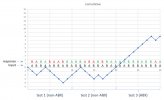@manisandher I'm sure you don't want to read another one of this kind of post, but it is written in good faith and I hope you could still find it useful and won't mind.

I've done my 'ABX time'. Scored 9/10 in a blind test... and still people didn't believe I heard what I did. So, no thanks.
You can't really blame people for being skeptical about these kind of claims - there's overwhelming evidence people in general can't reliably identify differences between reasonably well-measuring audio electronics. A common approach in this case is to follow the good old maxim "
extraordinary claims require extraordinary evidence".
Otherwise people could be spending time looking for causes of differences that might disappear in a rigorously controlled listening test.
It is simply good research practice to first establish the observed effect is real without any shadow of a doubt (and repeatable), before diving in and looking for its cause.
Also, scoring 9/10 one time in a controlled ABX test is not that remarkable, nor proof of being able to reliably hear a difference - e.g. flipping a coin enough times is bound to generate a sequence of 9 out of 10 tails in a row at some point, and maybe even on the first 10 if you're lucky.

On the other hand, scoring 9/10 (or 10/10) many times in a row would be a strong indicator there was an audible difference you could hear; but again it couldn't exclude issues with setup or methodology (which are unfortunately common because setting up rigorous tests is difficult).
What people seem to be missing is the PK Metric really is the gold standard for audibility and perception.
I'm sorry to ask - but do you have references to research formally linking PK Metric results to results of perceptual studies / listening tests?
Don't get me wrong - I'm a fan of the tool (and in general the amazing work and resources provided by
@pkane), but I'm not convinced the figures you show in your first post really have predictable correlation with audibility. However I'm happy to be proven wrong and to learn something new!
E.g. in
my online ABX test of two very different DACs the
PK Metric gave -56dBrms for the two files, yet the results of over 350 participants do not indicate differences were audibly significant for the overwhelming majority of participants. And in this case the differences between DACs were ~30dB of SINAD and one even had a significant frequency response deviation - so quite significant (I was actually expecting a very different distribution)!
Humour me. Take a listen to the 3 files I linked. One should sound 'duller' than the other two. That's the dCS. The other two sound similar.
Sorry I might be blind - but I can't see the links to the source audio files recorded with the 3 DACs in any of the posts 
EDIT: Sorry, missed the post - found it now!

